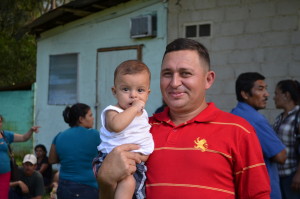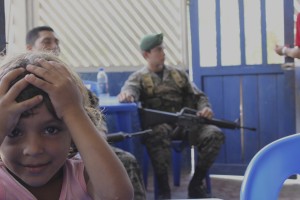HSN member organizations and others (32 total) joined in a letter in support of Chabelo Morales (English letter below) as he goes to his third trial for the same charges. 
September 2015
As representatives from the international human rights and solidarity community, we come together to demand justice for José Isabel “Chabelo” Morales during his retrial. In that there are currently over 5000 campesinos with judicial proceedings against them, Chabelo’s case is emblematic of the criminalization of peasant farmers (campesinos) who struggle for access to land.
In light of the persistent violations to human rights in Honduras, we demand:
⦁ That Chabelo’s retrial scheduled for September 28th – October 9th, 2015 be fair and impartial. Further, we demand unconditional freedom for Chabelo.
⦁ A full investigation into human rights violations and judicial irregularities surrounding all of Chabelo’s judicial hearings.
⦁ A full investigation into the ongoing threats and intimidation against the Morales family and community of Guadalupe Carney.
⦁ A full investigation into the abuse of authority of Colonel Henry Osorto Canales who was recently nominated for advancement from Sub-Commissioner of the National Police to the position of Commissioner.
⦁ A suspension of aid to Honduran police, military and security until the human rights violations perpetrated by these forces ceases; specifically, the continued aid by the United States to the National Police and funding to the Public Prosecutors office (Ministerio Publico) given the ongoing abuses.
José Isabel “Chabelo” Morales López, 39, was in prison for 6 years, 9 months, and 7 days for a crime that he did not commit. He and his family are campesinos in the Aguán Valley in the heart of the African palm-producing region of the northern coast of Honduras. His arrest and imprisonment were aimed at punishing and criminalizing the campesino movement in Honduras as well as being products of the well-documented corruption and impunity that has this country in its grip. Chabelo is recognized as being unjustly imprisoned by numerous human rights and rural advocacy groups including Via Campesina, SOAW, FIAN International, COFADEH and ERIC-SJ.
Chabelo was arrested in October 2008 after heavily armed members of Henry Osorto’s family and private security attacked the campesinos in an attempt to illegally take land that had been legally granted to the campesinos. One campesino was killed by shots from the Osorto house and 11 members of the Osorto group were left dead. In a clear conflict of interest and abuse of authority, Henry Osorto led the investigation which was incomplete, inconsistent, and forensically questionable.
Arrest warrants for 36 residents of Chabelo’s community were issued without evidence that theindividuals were involved. Chabelo was one of them, he and one other person were the only ones arrested and charged with 11 counts of murder, arson, and robbery despite there being no concrete evidence of their involvement. At his trial over two years after his detention (a clear violation of the Honduran Penal Code, and notably after the military coup in June 2009) the charges were reduced to one count of homicide. The other person was found not guilty due to contradictions in the testimony of the prosecution witnesses and yet they let these same contradictions stand in the conviction of Chabelo.
The panel of judges found Chabelo guilty despite a lack of evidence and the contradictory stories, but sentencing was delayed for over 2 years. Because of that and many other irregularities, the Honduran Supreme Court annulled his conviction and ordered a new trial which took place in January 2014. The new trial was moved to another department, but was assigned judges from the Aguán, including two who had refused to release Chabelo from prison pending the new trial, a clear violation of the Supreme Court order. The defense asked for the two judges to recuse themselves but lost the decision.
Prosecution witnesses including Henry Osorto perjured themselves once again, radically changing their testimony and contradicting their sworn statements in an attempt to incriminate Chabelo. The judges refused to allow the defense to place those contradictions into the record. The prosecution echoed statements made by Osorto about the small farmers in general being violent terrorists rather than giving evidence as to Chabelo’s involvement. Defense witnesses presented the same testimony as previously, noting that Chabelo was not present at the scene when the confrontation and deaths occurred. The judges found Chabelo guilty and he was sentenced to 17.5 years. Chabelo’s defense lawyers filed an appeal, which was finally reviewed by the Supreme Court.
The court once again annulled the conviction and sentencing based on procedural inconsistencies on the part of the prosecutor and judges, but once again ordered a retrial. The Defense also solicited the court to free Chabelo pending the retrial based on numerous violations to the penal code. This was the seventh solicitation in five years based on these violations.
The initial hearing of the retrial was held on July 24th, 2015 in La Ceiba. The magistrates quickly ruled in favor of Chabelo’s release based on the violations and scheduled the retrial to be held between September 28th and October 9th in Trujillo.
Based on the clear violations to the human rights of Chabelo Morales, we demand his unconditional freedom. In addition to the demands stated above we further demand protection from retaliation on the part of Colonel Henry Osorto Canales against Chabelo Morales and his family.
Signed,
1) La Voz de los de Abajo, Chicago
2) Alliance for Global Justice
3) Nicaragua Center for Community Action (NICCA), Berkeley, CA
4) International Action Center
5) Michigan Emergency Coalition Against War and Injustice
6) Colectivo Honduras USA Resistencia=libre (D19/New York)
7) Task Force On the Americas
8) San Francisco School of the Americas Watch (SOAWSF)
9) Latin America Solidarity Committee, Milwaukee
10) Bay Area Latin American Solidarity Committee (BALASC)
11) The Cross Border Network, Kansas City, MO
12) Portland Central America Solidarity Committee
13) Hondureños Por La Pachamama
14) Oakland – School of the Americas Watch, USA
15) Hondureños D19 Northern California
16) Radios Populares, Chicago
17) Witness for Peace Southwest
18) Gay Liberation Network, Chicago
19) US El Salvador Sister Cities
20) Inter-Faith Committee on Latin America, St. Louis
21) School of the Americas Watch (SOAW)
22) Chicago Religious Leadership Network on Latin America (CRLN)
23) FIAN Internacional – Sección Honduras
24) Movimiento Ambientalista Santabarbarense (MAS)
25) Foro de Mujeres por la Vida
26) COLLETTIVO ITALIA CENTRO AMERICA, CICA
27) Grassroots International
28) Observatorio Permanente de Derechos Humanos del Aguán
29) Voices for Creative Nonviolence
30) Workers World Party
31) Loretto – Kansas City
32) 8th Day Center for Justice, Chicago

